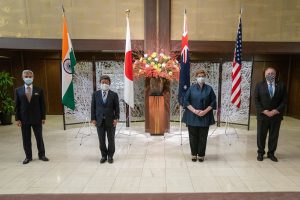In late September, Ashley Tellis from the Carnegie Endowment for International Peace, writing in an Indian publication, The Print, made what should have been an uncontroversial argument. He asserted that if the Indian government continued to undermine the country’s liberal character that this would make it more difficult for other liberal democratic countries to partner with it. Yet there is another component to this equation. As the foreign ministers of Australia, United States, Japan, and India met in Tokyo in early October as the Quad, this group’s effective leader, the U.S., has also been exhibiting signs of liberal democratic decay. That’s something keenly felt in both Australia and Japan.
At the meeting in Tokyo, U.S. Secretary of State Mike Pompeo made a statement that the Quad was composed of “vibrant and pluralistic democracies with shared values.” This may have once been true, but today it is a statement with considerable caveats. Two members of the Quad are currently struggling to live up to their own ideals. Both these countries have powerful political parties — the Bharatiya Janata Party (BJP) and the Republican Party — that are arguably “anti-system parties”; that is, parties that are suspicious of their respective country’s constitutional and political frameworks.
Values are only values if they are actually defended and adhered to, rather than simply used as slogans. These two parties currently do not have a genuine commitment to the ideas that Pompeo claims are inherent to the Quad. At present the Republican Party believes that democracy cannot produce outcomes in its favor, so it is actively seeking to discredit the system and undermine its smooth operation. During the presidency of Donald Trump, the party has also demonstrated a distaste for key liberal principles like the rule of law and the freedom of the press.
In India, meanwhile, because the BJP is winning elections, it has no reason to challenge democracy. However, the system doesn’t hold an intrinsic value to the party; it currently does produce results in the BJP’s favor, but the party is not democratic by nature. Nor is it liberal by nature, with a deep suspicion of India’s constitution, and a disdain for the restraints of constitutionalism in general. The party’s ascension has come via setting itself against the founding ideals of the modern Indian state.
Through these traits, both the Republicans and the BJP actually share more in common with the Chinese Communist Party (CCP) than other parties in their own countries. The two parties also believe in displays of raw power, albeit without either having fully captured the state in the way the CCP has. However, they are continually proving themselves unwilling to submit to the constraints placed upon their actions by liberal democratic principles — something the CCP obviously eschews — and see blatant self-interest as their only operating practice.
So how much of this actually matters to the Quad? Should this be a serious concern for the Quad’s other two members, Australia and Japan? Or is the idea of “vibrant and pluralistic democracies with shared values” just a branding exercise, and what really matters are the practicalities that the Quad is seeking to defend? That is, are interests more important than values?
At present all four countries have a shared concern about the behavior of China. They see Beijing as a threat to rules and norms of international interaction that have worked well to allow consistent freedom of exchange and broadly maintain a peaceful coexistence. The CCP’s ideas and inclinations about power find these rules and norms unsatisfactory, despite them having allowed China to amass power so rapidly. As a party that exercises raw power at home, it wishes to do likewise abroad.
Therefore, the collective interests of the Quad are tied to constraining China’s ability to undermine these norms. However, the liberal international norms they are seeking to defend are intrinsically linked to liberal domestic norms. They flow from the same philosophical well, with both being built on ideas about power restraint, mutually beneficial rules, and consistency of action in order to establish and maintain a high degree of trust. If the domestic bedrock of these ideals is in noticeable decay, then that makes it far more difficult for their international equivalents to be promoted and defended.
This makes values and interests inseparable, with a country’s values creating its interests. So for the Quad to be an effective institution to preserve a rules-based order in the Indo-Pacific, it has to stand for more than just a blunt opposition to China. All four of its members do actually need to embody the idea of being committed liberal democratic societies, and not simply mouth this as an empty platitude.
In two weeks the citizens of the United States will have the opportunity to make a clear choice about whether they wish to remain a liberal democratic society, or abandon these principles for a more autocratic form of governance. The former would elicit a huge sigh of relief from both Canberra and Tokyo, who both need their primary security partner to be a more stable, consistent, and ideologically-aligned actor. This result would also give the BJP less cover to advance its own autocratic tendencies, and allow the Quad grouping to advance its mutual interests with greater credibility.
































